Christopher Walken will tell you what irritates him. "Quite often, I'll be sent a script for a movie," he says. "And I find that I like it, so I say I'll do it. But then they rewrite it for me. They make it quirky. Odd. I find that rather annoying. I call it Walkenising."
He chuckles, then stops dead. There is silence. We are on the phone, so that when he speaks it is hard not to wonder what else he might be doing. "I'm in Connecticut," he says when I ask, at the rural home he shares with his wife.
The irony is that the film he's promoting, the elegant drama A Late Quartet, is his most un-Walkenised in years. Rather than, say, a neurotic hitman, he plays a gentle cellist whose diagnosis with Parkinson's disease causes schisms in a New York string quartet. The role clearly came as a relief. "Yes, it was different for me," he says. "I don't usually get to play fathers or grandfathers or uncles. Now that I'm older, maybe I can play people closer to myself. I'd like that."
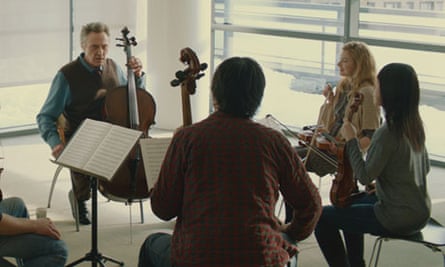
At 69, his manner is sometimes animated, more often businesslike. The diction, of course, is a marvel – the unlikely pauses and emphases so familiar from his films, put down to a childhood in the melting pot of Astoria, Queens. When I ask why he thinks he became so typecast, the answer in full goes: "Well, movies are so expensive to make that ... if something works you get asked to do it again. And when I started I did well with these ... eccentric people. Troubled. Often villains ..." He gives a small cough. "And that's fine," he says, sadly.
It sounds as if he wants to play regular guys. Does he feel like one?
"Well, my life is really quite conservative. I've been married nearly 50 years. I don't have hobbies or children. I don't much care to travel. I've never had a big social life. I really just stay home, except when I go to work." A pause. "So in that sense I suppose I'm a regular guy."
His background, he admits, is not everyone's idea of regular. A child actor from the age of five, "there were schools for kids like me that also made it possible to work, and that's where I got my education".
At 15, he joined a travelling circus, his duties including lion taming (he says he only worked with one lion, old and dog-like). Then came musical theatre. Cast as Riff in a touring production of West Side Story, the actor playing his girlfriend was called Georgianne Thon. He promptly married her.
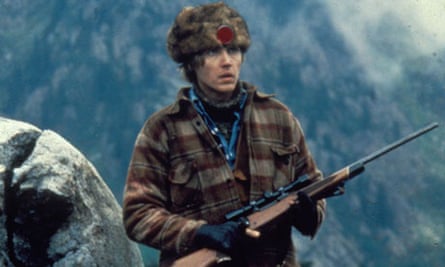
But still he sees himself as much removed from the skewed characters that made his name on screen – raving suicidally in Annie Hall, playing Russian roulette in The Deer Hunter, stealing Pulp Fiction with a monologue about the bodily hiding place of a family heirloom. They may share his pallor, his vertical hair and strange inflections, but he is as much an observer of them as we are.
"I have one of those satellite things," he says. "On my television. And there are maybe 40 channels of movies. So once a day pretty much every day I'll surf those. I just go from one movie to another, watching 10 minutes of this, 10 minutes of that. And often there's something I'm in. And sometimes I'm quite good in it. And I'll sit and watch."
It is, he says, "very educational". I ask him what he has learned. "That with every movie I make, there are some scenes where I'm good, and some where I'm not. With me, it's always hit and miss."
A keen reader of his own reviews, his approach to acting is self-sufficient. "I don't much like being directed," he says. "I enjoy being allowed to play." Naturally, in making more than a hundred films, there have been conflicts. "If somebody insists I do something, I have said: 'Please – don't insist I do that. I'm telling you, you're making a mistake.'" Again, he sounds heartbroken. "It's very rare, but it happens. It's just, as they say, the way the cookie crumbles."
Work is rarely brought home, slavish research not generally his scene. While co-star Philip Seymour Hoffman learned the violin for A Late Quartet, Walken focused only on simulating playing the cello. The real thing held no appeal. "As a kid, I had piano and guitar lessons. I never got anywhere. I wasn't much interested. And physically, my hands ... they're rather large and clumsy. So it wasn't for me. I was a pretty good dancer though."
Dancing and his life onstage come up a lot. By the time he made his first film – 1970 surveillance thriller The Anderson Tapes – he had been performing for more than 20 years. As a boy, still going by his real name Ronnie, he was thrust with his two brothers into theatre jobs and the live variety TV shows that broadcast nightly from the neon heart of 50s Manhattan. Was performing something he was drawn to? Comfortable with?
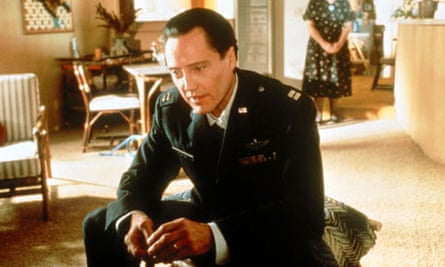
"No. Neither. As a child, you don't seek that out. My mother came to America as an adult. She came from Glasgow, in fact. She was smitten with movies, she read the movie magazines, and she wanted her kids to be in showbusiness. So I kind of just got put there."
He sounds less than thrilled. "Oh no, I'm really very grateful. I can't imagine anything else I could have done that would have given me such a nice life."
The one shadow, of course, has been the death of Natalie Wood. In November 1981 the actor drowned off a Californian island while staying on a boat with Walken and her husband Robert Wagner. The case remains open. Walken, never a suspect, has chosen not to speak about it since 1997. You wonder how much of his reclusive bearing is a knowing shtick ("I wouldn't ever go into New York just for dinner or, you know, to visit someone") – and how much a response to having been so close to tragedy.
For all his showbusiness childhood, much of it was spent suffering from stage fright. Even now, six decades later, Walken is often called on to embody a certain tightly wound quality. Would he say he was a nervous person?
"Not nervous exactly. But I'm very cautious. I worry. I tend to have contingency plans." About money? "Money and everything else. There has to be Plan B, and then Plan C. Always. It's just my nature. I know I might have a public persona of being a little wild, but I wouldn't have stuck around so long if that were the case."
He settles into the assured tone of the veteran actor rolling out an anecdote. "You know, I once sat next to Walter Matthau on an aeroplane. And for a very long time we didn't say anything. Then suddenly he turned to me and said: 'I know who you are! You're the guy who plays the crazy guys! You know, you got to have your feet on the ground to play crazy guys all the time.' And I said [... he leaves a beat, timing what will surely be a classic payoff] 'Yes – that's absolutely right.'"
Still, the crazy guys have taken care of the bills. For years, Walken's approach to employment has been that if you want him, you can probably have him. "I never planned my career," he says. "I just decided to work when I could. And you do that knowing sometimes it'll be good and sometimes it won't. Temperamentally I'm just that way, and it's worked out rather well."
Except in making so many films, a frightening number vanish into obscurity. "I know! And often they're the good ones!" It happens all the time, he says, reeling off movies he admits even he forgot until they turned up on his TV. He enthuses over a 1994 romance called A Business Affair. I confess it passed me by. "It was made in London," he says meaningfully. "And I once made a movie in Wales that was really quite amusing. I don't think anyone saw that either. It's about rival undertakers. In Wales. It's called Plots With A View. A fun movie. It's not a very good title." (In Britain it was called Undertaking Betty, which may be worse.)
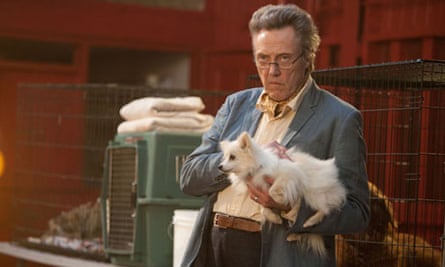
But for Walken, there will always be another film. In this conversation at least, all roads lead back to work. In a week, he will turn 70. He is troubled by arthritis. But still, he exercises, watches his diet, tries to get enough sleep. The incentive? "So when the phone rings and someone says, 'Come do this job', I'll be as fit and ready as I can."
Would his career have been possible had he had children? "Absolutely not. I'm sure many of the kids I knew as a child would have continued in showbusiness, but they had kids of their own, had to do something dependable. I didn't, so I could get by even in periods of unemployment."
Yet free time makes him uneasy. The usual diversions don't appeal. "A lot of my actor friends are passionate about golf or tennis," he says, as if they were passionate about dandruff. "Those things aren't for me." Is there anything he does that could be called a hobby? "I like to cook. You could call that a hobby. A hobby you can eat."
He says that last summer he made one of his rare trips to New York for a reading of Romeo and Juliet in Central Park. He played Mercutio. As a young man, he was Romeo on stage, but the reviews complained he made everything sound sarcastic. This time, the director told him he would make a fine Prospero in The Tempest. "So every day since I've spent a certain amount of time going over that part. Reading the lines. Thinking about them." Does he have a performance planned? "No, nobody's asked me yet. But someday they might."
He sounds instantly energised: "People say you make your own opportunities. I've never known how to do that. But I squirrel away my nuts for when it comes. And when it does, well, I'm rather good at seizing it."


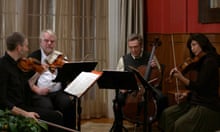
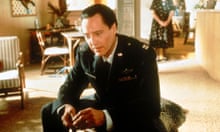


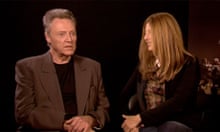
Comments (…)
Sign in or create your Guardian account to join the discussion